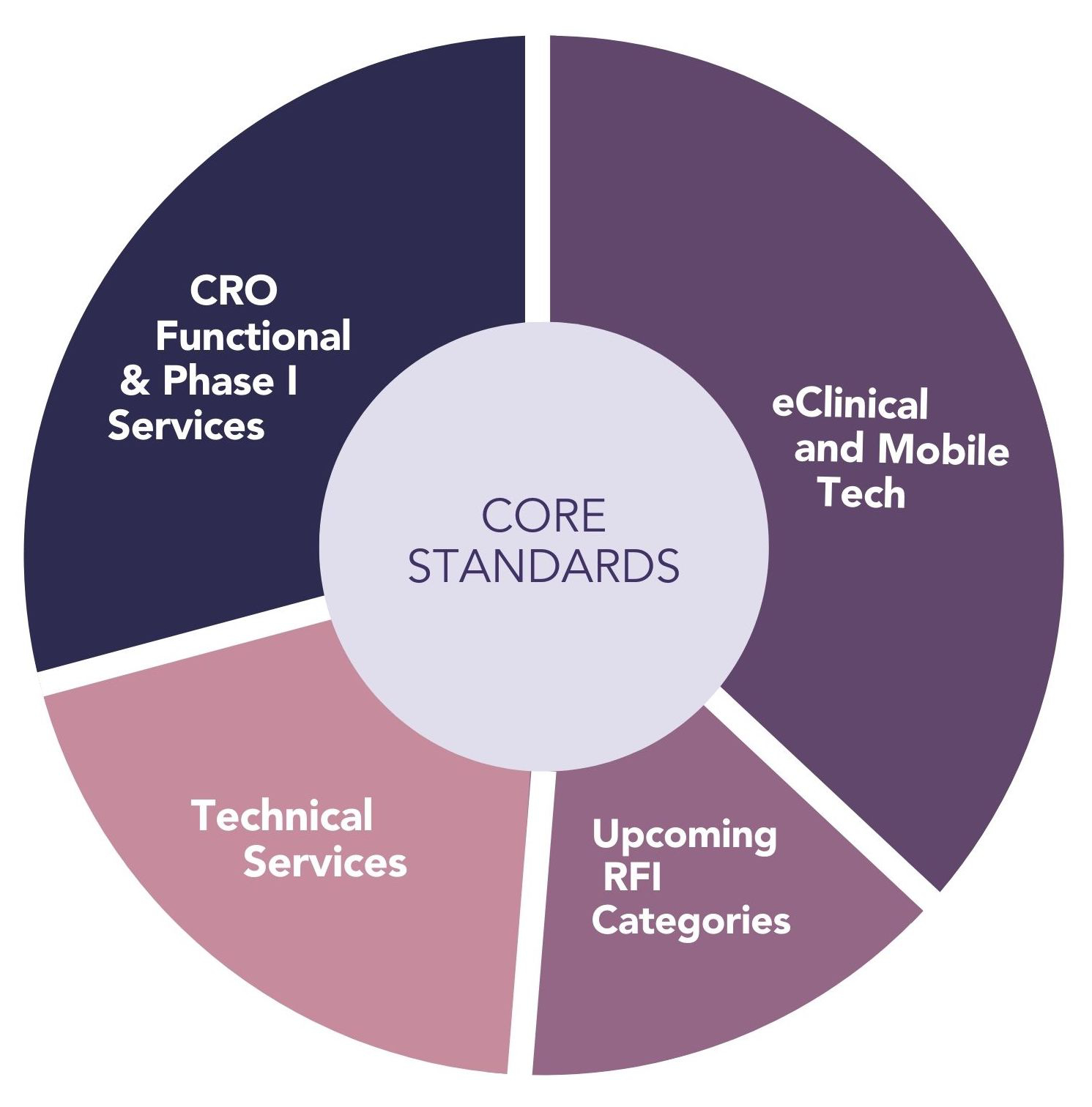Investigational and Medicinal Product (IMP) Management, Mobile Biomarker Sensors, and Mobile Respiratory Sensors added to the DQP
Clinical trial sponsors and CROs can now evaluate providers of Investigational and Medicinal Product (IMP) Management services, Mobile Biomarker Sensors, and Mobile Respiratory Sensors via the Diligent Qualification Platform
January 11, 2023 – We have just added three new Request for Information (RFI) templates to the Diligent Platform to enable clinical trial sponsors to qualify providers of IMP management services, mobile biomarker sensors, and mobile respiratory sensors. These latest RFI templates meet the requirements of global regulations and are based upon the most recent qualification standards developed by the WCG Avoca Quality Consortium.
Like the other service-specific RFI questionnaires in the Diligent Platform, the new RFI templates for IMP management, mobile biomarker sensors, and mobile respiratory sensors will be used alongside the Core RFI questionnaire to identify all the information needed for a comprehensive evaluation of these service providers.
The IMP RFI template
Effective IMP management is an integral and complex part of clinical trial management that requires extensive planning and resourcing. Trial sponsors must scrutinize any IMP providers against robust standards to manage and minimize risks to their trial.
With over 260 questions, the IMP management RFI template covers areas that refer to investigational product, investigational medicinal product, non-investigational medicinal product, auxiliary medicinal product, traditional “site to patient” supply, and “direct-to-patient supply.”
The Mobile Biomarker Sensors RFI template
The mobile biomarker sensors RFI template supports the qualification of mobile biomarker sensors providers. Biomarker sensors are wearable chemical sensors that provide real-time, non-invasive measurement of physiological properties such as pH and skin temperature as well as different biochemical analytics such as electrolytes, metabolites, glucose, cytokines, hormones, amino acids, and alcohol. These biomarker measurements may then be used to identify and quantify potential disease-related and/or detrimental physiological states.
The new RFI template for mobile biomarker sensors has over 70 qualification questions including qualifying questions for related services of centralized data collection and analysis, protocol development or guidance, and consulting. This new mobile biomarker sensor RFI template is in addition to existing RFI templates that cover traditional biomarker laboratory testing and devices that measure only heart rate, ECG, blood pressure, respiration rate, oxygen saturation, and actigraphy.
The Mobile Respiratory Sensors RFI template
Mobile Respiratory Sensors refer to a wide range of possible sensing systems for respiration monitoring such as bands, nose/mouth sensors, finger sensors, or other sensor devices that measure respiratory rate (RR), or the number of breaths per minute. Respiratory rate sensors are used to identify and quantify potential disease-related and/or detrimental physiological states. The current rise of wireless and wearable sensors creates the opportunity for continuous monitoring in traditionally unmonitored settings within clinical trials. Since this is a very new technology/service offering for clinical trials, there is currently very limited regulatory guidance specific to this area. It can be challenging for trial sponsors to qualify providers of Mobile Respiratory Sensors. Nonetheless, the use of mobile devices in clinical research has increased in recent years alongside more widespread adoption of decentralized clinical trials (DCTs).
The RFI template for Mobile Respiratory Sensors has over 80 qualification questions and covers areas specific to the sensors such as design, calibration, or maintenance as well as services required to use respiratory sensors in clinical research, such as centralized data collection and analysis, protocol development or guidance, and consulting.
The qualification standards developed by WCG Avoca change over time to reflect changes in global legislation and standards of best practice, and these changes are then reflected in the RFI templates used by the Diligent platform, to ensure qualification processes used by trial sponsors are compliant and up to date.
In addition to providing the RFI templates, Diligent also reviews providers’ responses for completeness and relevance before they are released to clinical trial sponsors. This additional check helps providers to be sure their responses are complete and valid while the extra layer of checks saves time and effort for quality and compliance teams at clinical trial sponsors. To learn more about how pharma and biotech companies can benefit from using the Diligent platform see Benefits for Sponsors.
Diligent now uses specialized RFI templates to cover 28 specific service areas, in addition to the core standard RFI completed by all providers on the platform. We have plans to add new templates for Investigator Site Qualification and others in the next few months. The complete list of RFI categories we cover is shown here:
CRO Functional & Phase I Services
- Clinical Monitoring
- Data Management
- Biostatistics
- Medical Writing
- Phase 1 CRU
- Patient Recruitment & Retention
- Investigator Contract Budgets & Payments
- Pharmacovigilance
- Investigational and Medicinal Product Management
Technical Services
- Central Laboratories
- Medical Imaging
- ECG
- Biomarker Laboratories
- Bioanalytical Laboratories

eClinical and Mobile Technologies
- eHealth Record to EDC connector
- Electronic Informed Consent
- Electronic Regulatory Binders (eISF)
- Mobile HCP visits
- Wearables/Sensors including Actigraphy
- Telemedicine
- eTMF
- IRT/IxRS
- COA, eCOA
- Mobile Cardiac Monitoring
- Mobile Biomarker Sensors
- Mobile Respiratory Sensors
Upcoming RFI Categories
- Investigator Site Qualification
To learn more about how Diligent can accelerate your trials and help your company save time and resources, please contact us at accelerate@diligentpharma.com
